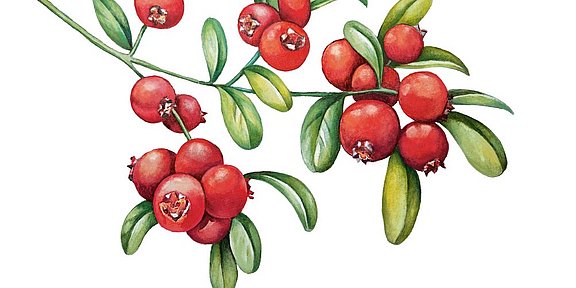Small and sour, but full of power
Cranberry
Cranberry (Vaccinium macrocarpon) is called “Kranichbeere” in German. But the name is not very common as the cranberry bush is indigenous to North America, and not Europe. The cranberry is related to the lingonberry (Vaccinium vitis-idaea L.) and the blueberry. The berries are similar in terms of appearance and taste, but when analysing the ingredients clear differences are found. That is especially true regarding flavonoids, a group of so-called secondary plant substances (SPS).
The ingredient profile of cranberries indicates certain proanthocyanidins (PACs) from a bioactive substance group that also contributes to the astringent flavour of fruits. The very special PACs of cranberries (A-type proanthocyanidin) are rumoured to have a positive effect on the lower urinary tract. Supposedly they impede the attachment of bacteria to the bladder wall.
Furthermore, fresh cranberries are full of ingredients with antioxidative effects such as vitamin C and E, ellagitannin and resveratrol. Also the trace elements manganese and copper, vitamin K and pantothenic acid (B5) are abundantly present. The proportion of fibre of the little berry is remarkable, too. Thus, for health reasons, the regular consumption of one cup of berries (approx. 2 x 100g) twice a day is recommended in the USA.
Together with the turkey, cranberries are an inherent part of the holiday meal on Thanksgiving Day in North America – to be found in the sauce, meat filling and desert. The taste experience is obviously at the forefront. Depending on preparation and cooking time, usually only a part of the original SPS and micro nutrient content is still present. Those who want to do use cranberries to benefit their urinary tract thus prefer to consume a PAC standardised and quality-controlled cranberry extract.
By the way: In principle, cranberries can be eaten raw and untreated. But as they taste bitter and extremely sour in this condition and also only remain fresh for a few weeks after harvesting, our retailers rarely offer these berries unprocessed and unsweetened.
